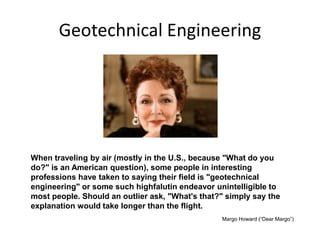The Ultimate Guide To Geotheta
The Ultimate Guide To Geotheta
Blog Article
Indicators on Geotheta You Need To Know
Table of ContentsGetting The Geotheta To WorkNot known Details About Geotheta Indicators on Geotheta You Need To Know3 Simple Techniques For GeothetaWhat Does Geotheta Mean?

They carry out website examinations, collect examples, perform laboratory tests, and analyze data to examine the viability of the ground for construction jobs - Engineer of Record. Based on their findings, geotechnical engineers supply referrals for structure design, incline stability, keeping frameworks, and mitigation of geotechnical risks. They collaborate with other specialists, such as engineers, structural designers, and building and construction groups, to make certain that geotechnical considerations are incorporated into the general task layout and implementation
By examining the habits and buildings of dirt and rock, they can identify prospective geotechnical threats such as landslides, soil negotiation, or slope instability. Their proficiency assists avoid failures or accidents that could endanger lives and residential or commercial property. Here are some thorough obligations and obligations of a geotechnical designer: Website Examination: Geotechnical designers conduct website examinations to collect information on subsurface conditions.
They interpret the data to comprehend the homes and habits of the dirt and rock, including their toughness, leaks in the structure, compaction features, and groundwater problems. Geotechnical Evaluation and Layout: Geotechnical designers analyze the data collected throughout site investigations to examine the security and suitability of the website for construction tasks. They carry out geotechnical calculations and modeling to assess factors such as bearing capability, settlement, incline security, side planet stress, and groundwater circulation.
The smart Trick of Geotheta That Nobody is Discussing
Foundation Layout: Geotechnical engineers play an essential function in designing structures that can safely sustain the intended framework. They analyze the dirt conditions and tons demands to figure out the ideal structure kind, such as shallow foundations (e.g., grounds), deep foundations (e.g (https://medium.com/@ianhammond2191/about)., piles), or specialized methods like soil enhancement. They consider elements such as settlement limits, birthing ability, and soil-structure communication to develop optimum structure layouts
They review construction plans, monitor site activities, and perform area inspections to confirm that the layout recommendations are complied with. If unexpected geotechnical concerns arise, they assess the scenario and offer suggestions for removal or changes to the design. Danger Assessment and Mitigation: Geotechnical designers examine geotechnical threats and threats connected with the job website, such as landslides, liquefaction, or dirt disintegration.

Cooperation and Interaction: Geotechnical engineers function carefully with other specialists included in a job, such as architects, architectural engineers, and building and construction teams. Effective interaction and partnership are necessary to incorporate geotechnical considerations right into the overall task style and construction procedure. Geotechnical designers give technical competence, answer queries, and make sure that geotechnical requirements are met.
Geotheta Fundamentals Explained
Right here are some sorts of geotechnical designers: Structure Designer: Foundation engineers specialize in developing and analyzing structures for frameworks. They analyze the dirt conditions, load requirements, and site features to figure out one of the most appropriate foundation type and style, such as shallow structures, deep structures, or specialized techniques like stack foundations.
They assess the variables affecting incline security, such as dirt buildings, groundwater problems, and slope geometry, and develop methods to stop incline failings and minimize threats. Quake Designer: Earthquake engineers concentrate on assessing and designing frameworks to hold up against seismic pressures. They analyze the seismic threat of a website, examine soil liquefaction potential, and create seismic layout requirements to make sure the security and resilience of frameworks throughout earthquakes.
They perform field testing, accumulate samples, and evaluate the accumulated information to define the soil properties, geologic developments, and groundwater problems at a site. Geotechnical Instrumentation Designer: Geotechnical instrumentation designers concentrate on tracking and measuring the behavior of dirt, rock, and frameworks. They set up and maintain instrumentation systems that monitor variables such as soil settlement, groundwater degrees, slope movements, and architectural displacements to analyze performance and provide early cautions click of possible issues.
Some Of Geotheta
They conduct examinations such as triaxial examinations, consolidation examinations, straight shear tests, and permeability examinations to gather information for geotechnical analysis and design. Geosynthetics Designer: Geosynthetics designers specialize in the layout and application of geosynthetic materials, such as geotextiles, geogrids, and geomembranes. They utilize these products to enhance dirt security, reinforce inclines, give drain solutions, and control erosion.
They have a tendency to be investigatory people, which suggests they're intellectual, reflective, and curious. They are curious, methodical, logical, analytical, and rational. Some of them are likewise social, suggesting they're kind, charitable, participating, person, caring, helpful, empathetic, tactful, and pleasant - Geotechnical Engineers.
In the office environment, geotechnical engineers utilize specialized software application tools to perform computations, develop styles, and assess information. They prepare records, testimonial task requirements, connect with clients and group participants, and coordinate job activities. The office setup gives a favorable atmosphere for research, evaluation, and partnership with various other professionals involved in the job.
The Facts About Geotheta Revealed
They frequently see job websites to perform site investigations, evaluate geotechnical conditions, and gather information for analysis. These gos to entail taking a trip to various places, sometimes in remote or challenging terrains. Geotechnical designers may execute soil tasting, conduct examinations, and monitor building and construction tasks to ensure that the geotechnical elements of the project are being applied appropriately.
Geotechnical engineers additionally operate in specialized geotechnical labs. In these facilities, they perform experiments, carry out examinations on dirt and rock samples, and evaluate the design properties of the materials. Geotechnical research laboratory engineers function thoroughly in these environments, dealing with screening devices, operating tools, and videotaping data. They collaborate with other lab team to ensure precise and reliable testing results.
Report this page